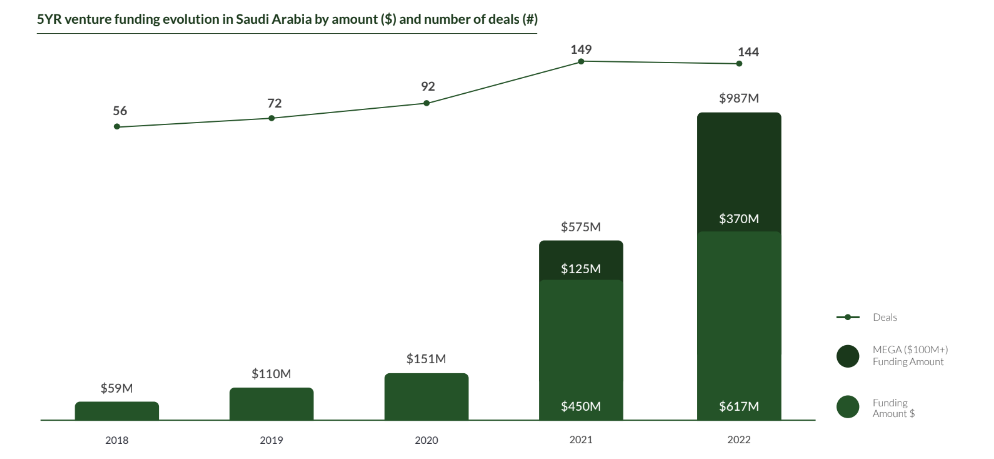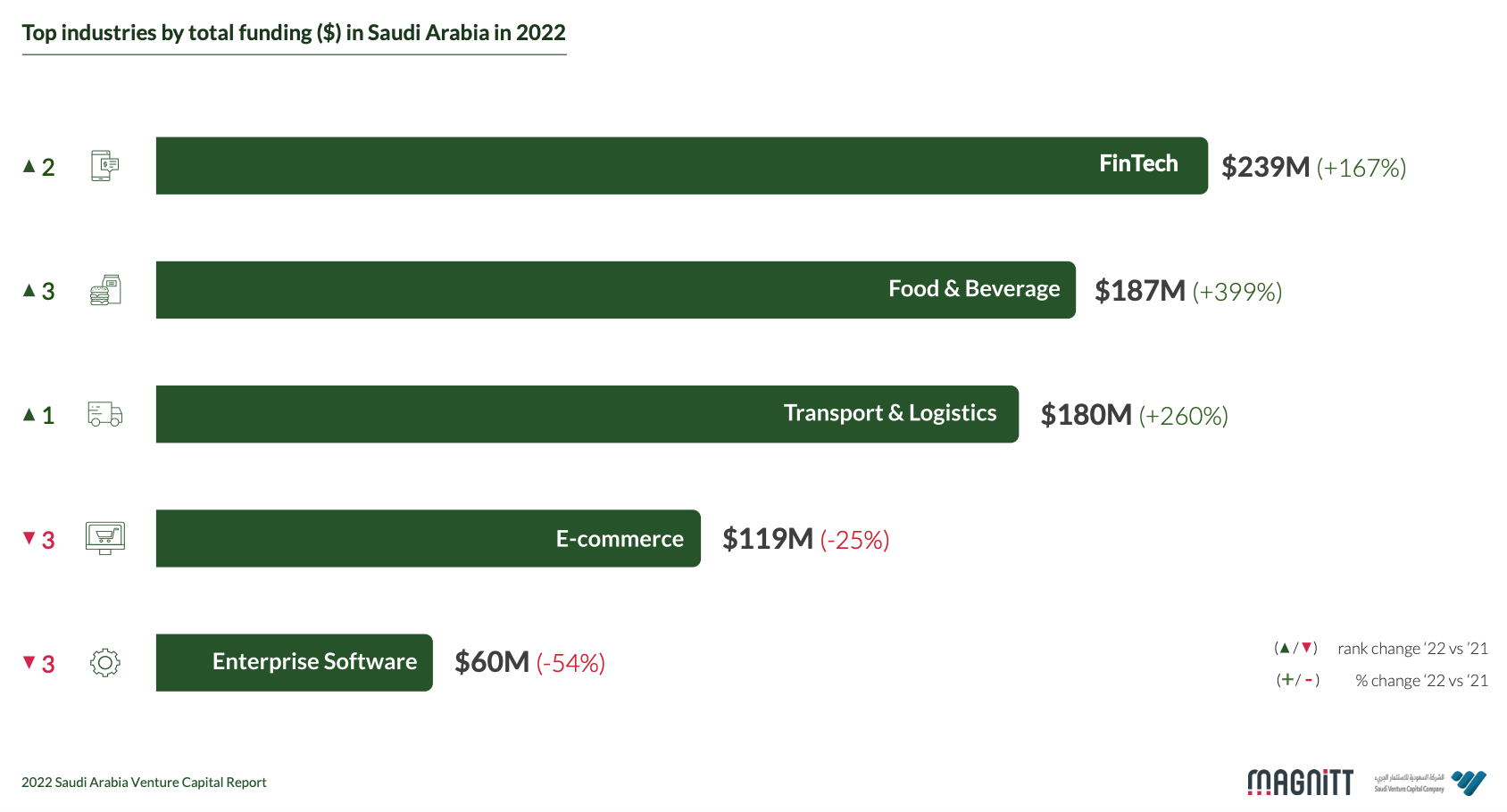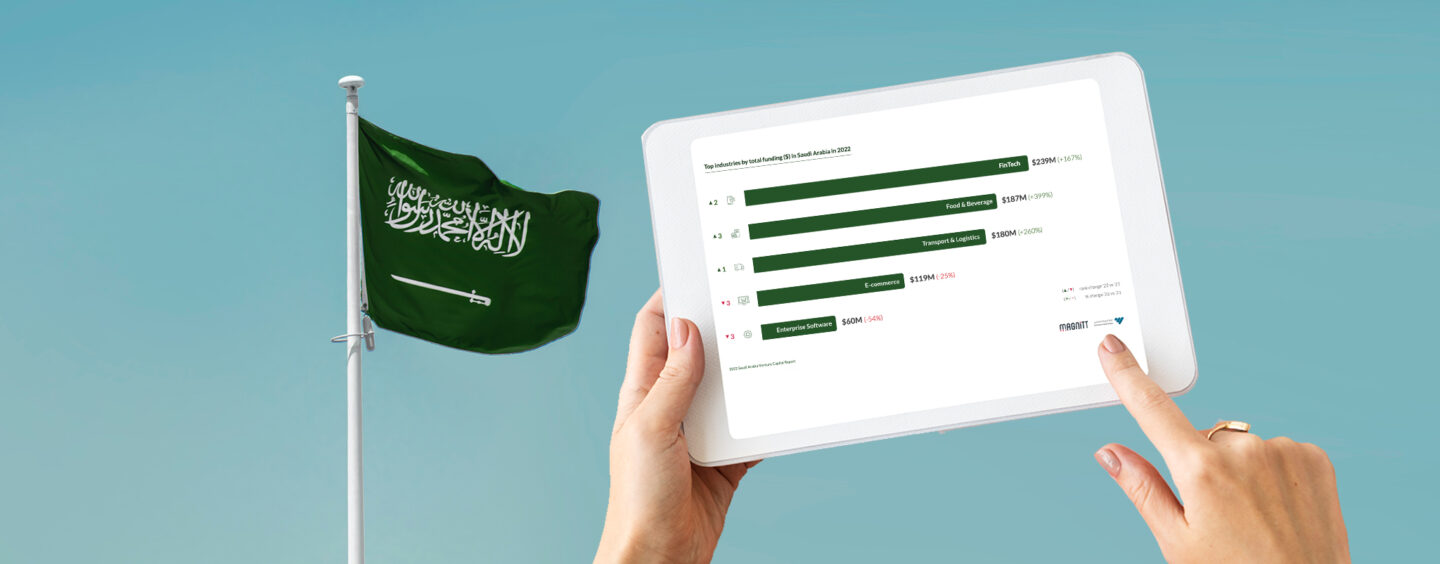2022 was a record-breaking year for venture capital (VC) investment in Saudi Arabia. Startups in the country secured a total of US$987 million across 144 deals, representing a staggering 72% increase in funding volume compared with 2021, according to a new report by Magnitt, a startup and venture investment data platform focused on the Middle East, and Saudi Venture Capital, a government VC fund.

Five year venture funding evolution in Saudi Arabia, Source: 2022 Saudi Arabia Venture Capital Report, Magnitt, Jan 2023
Fintech led the charts for funding and total deal number, accounting for 24% of all Saudi Arabia startup funding in 2022 and securing a total of US$239 million raised across 28 deals. The sum represents an impressive 167% increase compared with 2021, and pushed fintech two places up to overtake edtech and e-commerce to become the most funded startup industry in Saudi Arabia.

Top industries by total funding (US$) in Saudi Arabia in 2022, Source: 2022 Saudi Arabia Venture Capital Report, Magnitt, Jan 2023
The fintech funding momentum in Saudi Arabia was driven by mega-rounds of US$100 million and over closed by fast-growing startups including Foodics and Tamara.
Foodics, a cloud-based technology and payments platform for restaurants in the Middle East and North Africa (MENA) region, secured in April a US$170 million Series C – the largest round of the year in Saudi Arabia, and the third-largest in MENA. The company said at the time that it would use the proceeds for its regional and international expansion plan, including its mergers and acquisitions (M&A) strategy to increase market penetration.
Tamara, a buy now, pay later (BNPL) startup, closed a US$100 million Series B in August after recording a tenfold year-on-year (YoY) increase in revenue. The company, which clocks over three million customers, said it will be using the capital to expand its product offering across payments and shopping, in addition to launching in new markets.
Other notable fintech deals closed in 2022 included HyperPay’s US$36.8 million funding round, Lean Technologies’ US$33 million Series A, and Manafa Capital’s US$28.3 million Series A.
HyperPay is an e-commerce payments services provider in MENA; Lean Technologies is an open banking startup; and Manafa Capital is a licensed finance company specialized in debt-based crowdfunding.
New government initiatives gives fintech a boost
2022 also saw numerous initiatives being introduced by the Saudi Central Bank (SAMA) and the Capital Market Authority, further boosting fintech development and fueling bullishness on the sector.
SAMA released its Open Banking Framework in November, issuing a comprehensive set of legislation, regulatory guidelines and technical standards for data sharing. This was followed, in January 2023, by the launch of the Open Banking Lab, an initiative aimed at accelerating the development and adoption of open banking services by providing industry players with a technical testing environment to develop, test, and certify their open banking services to ensure compatibility with the Open Banking Framework.
SAMA licensed a total of 12 fintech companies in 2022, in addition to permitting an additional ten fintech ventures to join its regulatory sandbox.
This month, Saudi Arabia enforced its new corporate law, bringing various company-related regulations within a unified legislative format.
The Saudi ministry of commerce and CMA said the new law aims to stimulate the business environment and strengthen the regulatory environment for companies. It also provides a more effective framework for corporate governance to attract local and foreign investments, and will stimulating the growth of small and medium-sized enterprises (SMEs), the agencies said.
Saudi Arabia’s burgeoning fintech sector
Saudi Arabia’s booming fintech funding landscape came on the back of a surge in VC funding across the broader startup ecosystem. With nearly US$1 billion in funding raised in 2022, Saudi Arabia maintained its position as the second most funded nation across MENA, accounting for 31% of all MENA funding.
The United Arab Emirates (UAE) remained the region’s leader, securing a total of US$1.2 billion despite recording a YoY decline of 20%.
Across MENA, Saudi Arabia has one of the region’s most dynamic fintech sectors, which, according to official data, counted 147 active companies as of mid-2022. The number represents a 79% increase from 2021 and a 14.7-fold increase since 2018, showcasing how fast the fintech startup ecosystem has grown in just the span of four years.
According to Fintech Saudi, a body introduced in 2018 by SAMA in partnership with CMA to support the development of the local fintech ecosystem, the outlook for the sector in 2023 is optimistic.
This momentum will be driven by the forthcoming launch of three new digital banks, new open banking regulations, and the implementation of the Fintech Strategy, a national plan approved in May 2022 that aims to turn Saudi Arabia into one of the leading countries in the field of fintech, the organization said.
Of the top 15 most-well funded fintech startups in MENA, three are from Saudi Arabia: Tamara, Hala and Lean Technologies.








No Comments so far
Jump into a conversationNo Comments Yet!
You can be the one to start a conversation.